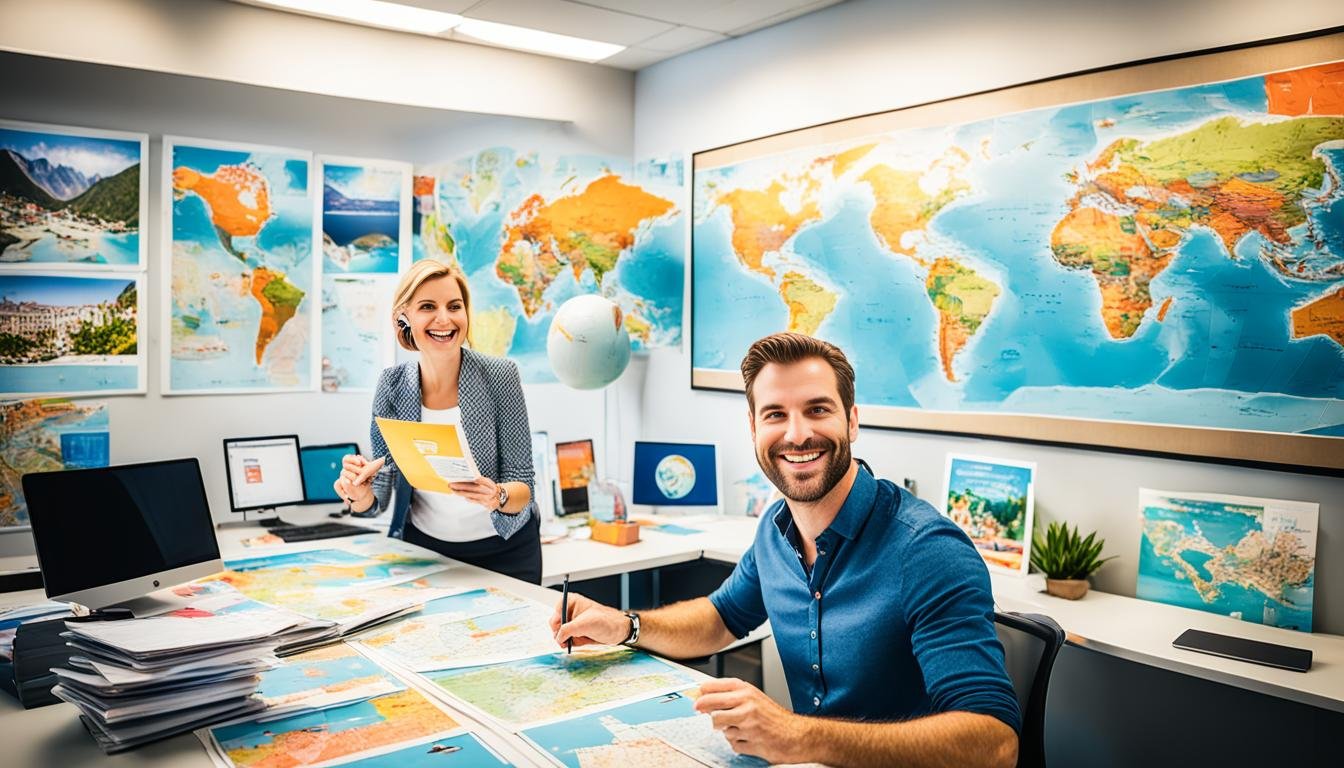Travel Agency Operations: Beginner’s Guide
Welcome to the exciting world of travel agency operations! This guide is perfect for those dreaming of starting their own travel agency. It’s also great for those wanting a deeper dive into the travel industry. We will explore travel agency management, customer service, and booking systems.
Picture yourself at your favorite cafe, enjoying a cup of coffee. You’re eagerly planning your next adventure. If you’re a travel buff, the thought of turning your love into a business is intriguing. You dream of helping other travelers make memories while making a living.
This is the starting point for travel agency operations. It’s where your zest for travel meets the art of managing bookings and providing top-notch customer service. Plus, you get to stay updated on the newest industry trends. As you move forward in this journey, you’ll learn about the many services a travel agency offers. This includes creating customized travel plans and managing complicated travel arrangements.
As the online booking sector grows and the travel industry evolves, understanding travel agency functions is crucial. With a strong knowledge base in travel agency management, you can offer smooth services to clients. This will let them focus on enjoying their travel to the fullest.
Key Takeaways:
- Starting a travel agency opens up a world of opportunities for travel enthusiasts.
- Travel agency operations encompass services, management, and booking systems.
- A travel agency helps clients create unforgettable travel experiences while ensuring exceptional customer service.
- Understanding travel agency procedures is key to providing seamless services in the digital age.
- Stay tuned as we explore the benefits, steps, and strategies for success in the world of travel agency operations.
Benefits of Starting a Travel Agency from Home
Starting a travel agency at home is a smart choice for many reasons. It has low startup costs and lets you work when you want. Because of this, it’s very popular among those wanting to be travel agents.
One major plus is it’s easy to get started. You don’t need a lot of money upfront like you would for a store. This saves you from spending too much at the beginning and lets you focus on growing your business.
Running your travel business from home also means you can make your own schedule. Being your own boss is pretty cool. It lets you balance work with your personal life better, which can be really important.
The majority of travel agents work from home, in fact, about 72% of them do. This shows there’s a lot of chances to succeed this way. More and more people want unique travel plans, which means there’s a big market out there for your services.
Being home-based also allows you to use technology to your advantage. Many people like to book their trips online now. So, as a home-based travel agent, you can use easy online systems to help your clients book smoothly. This focuses on giving good customer service.
“Starting a home-based travel agency offers the perfect opportunity for individuals with a passion for travel to turn their love of exploration into a lucrative business. With low startup costs, flexible working hours, and the ever-growing demand for personalized travel experiences, it’s no wonder that home-based travel agencies have become the go-to choice for aspiring travel agents.”
If you love traveling and want to make it your business, starting from home has many benefits. It’s a chance to share your love for travel or begin a new adventure in the travel industry. With hard work and commitment, you can make your dream job a reality.
Steps to Starting a Travel Agency from Home
Starting from home, you can build a successful travel agency with the right steps. Planning and executing each step carefully will set up your business for long-term success.
1. Find Your Travel Agency Niche
Identifying your niche is a first key step. This is the specific part of the travel industry you want to focus on. It might be luxury travel, adventure tourism, or weekend destination weddings. Pick a niche that matches your interests, experience, and who you want to serve.
2. Choose a Unique Travel Agency Name
Your agency’s name is important for your brand. Spend time picking a name that shows who you are and attracts your audience. A catchy, unique name can make people remember and choose your business.
3. Determine Your Travel Agency Business Structure
Finding the right business structure for your agency is crucial. You can go for a sole proprietorship, a partnership, or a Limited Liability Corporation for more protection. Think about the pros and cons of each, and get advice from experts. This decision affects how you do business and your financial risks.
4. Develop a Comprehensive Business Plan
A detailed business plan is vital. It outlines your goals, who you want to reach, how you’ll get clients, and your finances. A good plan guides your agency, attracts investors, and secures funds if needed.
5. Register Your Travel Agency
You need to register your agency with the authorities. This means getting the right licenses and permits. Following the law is key to running your agency smoothly and legally.
Starting a travel agency from home gives you freedom but needs careful planning. With these steps, you can start a solid travel business. It boosts your chance of success in a competitive market.
Setting Up Travel Agency Financials
As a travel agency owner, setting up financials is crucial. Separate your personal money from your agency funds. This helps with correct accounting and taxes. Here’s what you need to think about:
Business Bank Account
Start by opening a business bank account just for your travel agency. This account will track all your agency’s money movements. A separate account helps you watch your money in and out, plus keep things professional. It also makes your records clean.
Federal Employer Identification Number (FEIN)
You might want to get a Federal Employer Identification Number (FEIN) for your agency. It’s not always required, but it’s good business sense. This is especially true if you might change how your business is set up later. The IRS issues the FEIN for federal tax reasons.
An FEIN helps keep your finances and business life apart. It makes handling taxes easier. Plus, if you want to hire employees or work with contractors, it’s necessary.
To get an FEIN, apply on the IRS website. The process is quick and easy.
Proper Financial Management
More than just a bank account and an FEIN, you need good financial habits. This is key to your agency’s success and growth:
- Keep detailed notes of money in and out, plus tax papers.
- Check your financial health often, using software or a pro if needed.
- Use a budget to plan your spending.
- Always track and handle your cash well.
- Keep up with tax laws to avoid trouble with the IRS.
Good financial setup and practices pave the way for your agency’s financial and business success.
| Benefits of Setting Up Travel Agency Financials |
|---|
| 1. Separation of personal and business finances. |
| 2. Accurate accounting and tax compliance. |
| 3. Professionalism and improved record-keeping. |
| 4. Easier financial monitoring and analysis. |
| 5. Facilitation of future business growth and expansion. |
Choosing Between a Host Agency, Travel Franchise, or Independent Accreditation
Starting a travel agency involves choosing its structure. You can partner with a host agency, join a travel franchise, or get independent accreditation. Each has its benefits, helping you pick the best path for your agency’s success.
What is a Host Agency?
A host agency supports independent travel agents by offering resources and training. They provide access to preferred suppliers, knowledge of the industry, and back-office support. With them, you can focus on your clients as they handle admin duties.
The Benefits of a Travel Franchise
A travel franchise gives you a ready-made start for your agency. It comes with a well-known brand, marketing plans, and access to supplier networks. You get to serve an existing customer base, benefiting from the franchise’s reputation and marketing.
The Freedom of Independent Accreditation
Getting your own accreditation lets you choose your vendors and brand image. You can customize your business for your niche and market. This gives you full control and a unique selling point. It’s great for those wanting total autonomy in running their agency.
Every travel agency is different. The choice between a host agency, travel franchise, or being independent is personal. Consider what support, brand, and business control you want. This helps you make a decision that fits your long-term plans.
| Option | Advantages | Considerations |
|---|---|---|
| Host Agency |
|
|
| Travel Franchise |
|
|
| Independent Accreditation |
|
|
Thoroughly examining your options and considering the advantages helps in making the right decision. This applies to partnering with a host agency, joining a travel franchise, or opting for independent accreditation.
Resources for Professional Development in the Travel Industry
Being a travel agency operator means it’s crucial to keep learning. You need to stay on top of trends to succeed. Luckily, there are many ways to boost your skills and knowledge in the travel sector.
Trade Secret Podcasts
The Trade Secrets Podcast is a gem for those in the travel advising game. It’s hosted by experts and offers golden insights and strategies for today’s travel world. Listening to these podcasts on your way to work can be a game-changer. You’ll pick up tips and wisdom from the best in the business.
Educational Programs from Suppliers
Suppliers often host programs and webinars specifically for travel advisors. These sessions provide updates on cool destinations, insights into various products, and tips on how to sell better. Taking part in these events can broaden your knowledge. It also keeps you in the loop about the newest hotspots and accommodations. This way, you can provide top-tier service to your clients.
Industry Events and Conferences
Joining industry events and conferences is a great way to meet fellow advisors. It also lets you learn from the experts. Keynotes, discussions, and workshops at these events offer the scoop on trends and new tech. Meeting other pros can lead to new biz links and give you fresh ideas for your own operation.
Online Communities and Forums
Online groups and forums for travel advisors are like a gold mine. Here, you can connect with colleagues, swap stories, and get advice from the seasoned. Joining in discussions and popping your questions can lead to a wealth of new knowledge. They keep you up to date on what’s happening and share the latest best practices.
Investing in your career’s growth is essential in the ever-changing travel sector. By tapping into resources like podcasts, supplier programs, events, and online groups, you can soar. These tools will help you stay ahead, hone your skills, and provide amazing trips to your clients.
Tour Operator Business: Steps to Get Started

Do you love to travel and dream of running your own tour company? Follow these steps to get started on the right path:
- Determine your business niche: First, decide what you love and know most in the travel world. This choice shapes your tours and makes them stand out.
- Evaluate tourism opportunities: Look into what your area needs for tourism. Knowing what’s in demand will guide your tour planning.
- Register your tour company: It’s a must to register your tour business before opening. This is key to running a legal and safe operation for your clients.
- Obtain necessary licenses and permits: Every place has its own rules for tour companies. Make sure you get any needed permits to keep your tours safe and legal.
- Design unique and engaging tours: Create tours that fit your niche and appeal to your customers. Memorable tours are the heart of a great tour business.
- Build relationships with suppliers and partners: Good partnerships with hotels, transport, and activities are vital. They ensure good deals and top-quality service for your customers.
- Develop a marketing strategy: Know who you want on your tours and make a plan to reach them. Use social media, online platforms, and travel agencies to spread the word about your business.
- Launch your tours: With everything set, it’s time to start your tours. Focus on top-notch customer service to get great reviews and recommendations.
To start a tour business, you need to plan, be creative, and put in hard work. Tailoring your tours to your vision will help your business grow and succeed.
Developing Your Tour Operator Brand
Building a strong brand is key for a tour operator. Your brand reflects your company’s heart for your customers. It shows why your tours stand out. Here are tips to build your brand:
Crafting Your Brand Story
The story of your brand tells your company’s values and goals. It should touch your customers’ hearts. Share why you love travel, what inspired your company, and how your tours change lives. A strong brand story makes your tours unique, drawing in like-minded customers.
Creating a Visually Appealing Tour Logo
A great tour logo is vital for showing your brand visually. It must be special, easy to remember, and show what you offer. Use this logo everywhere you promote your business. This includes your website, brochures, and ads. A good logo builds trust and recognition.
Developing a Professional Travel Website
Your website is a major way to reach and impress customers. Make sure it looks good and is easy to use. It should clearly show what your tours are about. Adding online booking helps customers easily secure their spot.
Make sure your site can be found easily online. This means search engine optimization. Also, add testimonials from happy customers. This builds trust.
Defining Your Unique Selling Proposition
Your unique selling proposition (USP) makes your tours shine above the rest. It could be about focusing on a certain place, top-notch customer care, special connections with local vendors, or unique tour activities. Clearly tell customers what makes your tours special. This helps you cut through the noise in the market.
Elements of a Strong Tour Operator Brand
| Elements | |
|---|---|
| 1 | Brand Story |
| 2 | Tour Logo |
| 3 | Travel Website |
| 4 | Unique Selling Proposition |
Focus on these elements to make your brand stand out in the travel world. Crafting a solid brand story, designing an eye-catching logo, and building a top-notch website are essential. Add a clear USP. This way, you’ll attract customers who value what your tours offer.
Registering and Legal Considerations for Tour Operator Business
To begin a tour operator business, you need to focus on the legal side and registration details. It’s important to follow certain steps to keep your business safe and compliant. This guide will help you understand what you need to do.
1. Business Name Registration
Pick a name that stands out and sticks in people’s minds for your tour operator business. Once you have a name, register it with the right authorities. This will help build your brand reliably.
2. Business Structure
Decide the best way to set up your tour business. This could be as a sole owner or maybe a Limited Liability Company (LLC). Talking to lawyers or advisors is smart because they can guide you well.
3. Liability Insurance
It’s crucial to have liability insurance. This insurance protects your company and clients if something unexpected happens during a tour. It keeps your money and reputation safe.
4. Tour Guide Registration
Make sure to check local laws on if tour guides need to be registered or licensed. You must follow what’s needed to run a legal and top-notch tour operation.
5. Business Bank Account
Having a separate business bank account from your personal one is key. It helps keep your finances organized and makes it easier to do your taxes accurately.
By keeping up with these legal steps, your tour operator business will stand on a strong foundation. This way, you’re all set to start a journey towards successful entrepreneurship.
Writing a Tour Operator Business Plan
A good tour operator business plan is key to growing and succeeding. It’s like a map for your decisions and goals. Your plan needs to cover many important areas, such as:
Description of Your Company
Start by giving an overview of your business. Talk about its goals, values, and what makes it special. Show how your tours are better than others. Focus on the amazing experiences you offer.
Market Analysis and Competition
Do your homework on the market and your competitors. Find out who your customers are and what they want. Look at overall market size and the trends. Know your competition’s strengths and weaknesses.
Partnership Opportunities
Think about partnering with local businesses and others to make your tours great. Explain how these partnerships will improve your business. They can also make your tours unforgettable for customers.
Small Business Goals
Set goals for your business that are clear, doable, and timed right. Outline how you will meet these goals. This could mean selling more, reaching new markets, or offering new tours.
Marketing Plan
Talk about how you’ll get the word out about your tours. Mention which ways you will use to promote them, like social media or working with influencers. This section should also include how you’ll handle branding and advertising.
Operations Plan
Explain how your business will run every day. Tell about booking, customer questions, and tours. Also, mention how you’ll make your tours great, deal with problems, and help in emergencies.
Vendor Lists
Keep a list of places you want to work with for your tours. Include their contact info and any deals you have with them. This will help keep your tours running smoothly.
Services
Tell exactly what tours and services you have, including where they go and for how long. Explain what’s special and valuable about each tour. Also, mention if customers can customize or add anything to their tours.
Financial Projections
Show what money you expect to make and spend in the first 1-5 years. Think about your prices, when you’ll advertise, and how you’ll grow. This info is useful to check if your business can make it financially and to get funding if you need it.
One last thing: Keep your business plan up to date. It’s there to help you through the ups and downs of the travel business. A strong plan makes you look good to investors and others, ensuring success in the long run.
| Section | Description |
|---|---|
| Description of Your Company | Overview of your tour operator business, mission, vision, and unique selling proposition. |
| Market Analysis and Competition | Research on target audience, market size, trends, and competitive landscape. |
| Partnership Opportunities | Potential collaborations with suppliers and entities to enhance tour offerings. |
| Small Business Goals | Define short-term and long-term goals for your tour operator business. |
| Marketing Plan | Strategies for promoting tours, branding, advertising, and customer retention. |
| Operations Plan | Day-to-day processes, customer service, tour logistics, and risk management. |
| Vendor Lists | List of preferred vendors and suppliers for tour components. |
| Services | Description of tours, itineraries, and unique features. |
| Financial Projections | Projected revenues, expenses, and cash flow for 1-5 years. |
Conclusion
Starting a travel agency or tour operator business needs a solid plan. You will need to do some research and then put things into action. By taking the steps shown in this beginner’s guide, you can start a travel agency or tour operator business that does well.
Always remember why you love travel. Use your passion to offer unforgettable experiences to your customers. You can make your business stand out by focusing on unique services or specific types of travel.
Keep learning to keep up with the travel industry. This means staying on top of the latest trends in running a travel agency or tour business. By doing this, you can offer great customer service and keep ahead of your competitors.
Best of luck on your travel business journey! With hard work and a never-give-up attitude, you can make your travel dream a success. Your business will help others explore and enjoy the wonders of the world.
FAQ
Q: What are the benefits of starting a travel agency from home?
A: Starting a travel agency from home is low-cost and offers flexible hours. It’s easy to get into and lets you serve clients.
Q: What are the steps to starting a travel agency from home?
A: To start, pick a niche and a catchy name. Decide how you’ll run your business and create a detailed plan. Then, get your agency registered and the right permits.
Q: How should I set up the financials for my travel agency?
A: Keep your business and personal money separate. Open a business account for your travel transactions. Also, think about getting a special tax ID for your company.
Q: Should I join a host agency, travel franchise, or obtain my own accreditation?
A: Your choice depends on what you want to achieve and the resources you have. A host offers support, a franchise comes with a known name, and going solo lets you build your unique brand.
Q: What resources are available for professional development in the travel industry?
A: You can learn a lot from podcasts and courses. Joining events and online groups connects you with helpful professionals and opportunities.
Q: What are the steps to start a tour operator business?
A: To get going, pick what types of tours you’ll offer and register your business. Create exciting tour packages, find good partners, plan how to reach customers, and then start your tours.
Q: How can I develop a strong brand for my tour operator business?
A: Create a brand story that speaks to your customers. Make a striking logo and keep it in everything you do. A great website for booking tours also helps. Highlight what makes your tours different.
Q: What legal considerations should I be aware of when registering a tour operator business?
A: Choosing a unique business name and the right structure is important. You’ll also need insurance and may have to register as a tour guide. Setting up a separate bank account is crucial for financial clarity.
Q: How important is writing a business plan for a tour operator business?
A: A solid business plan is your roadmap to success in the tour business. It covers your company’s story, the market, how you’ll stand out, your strategy, and future goals.







